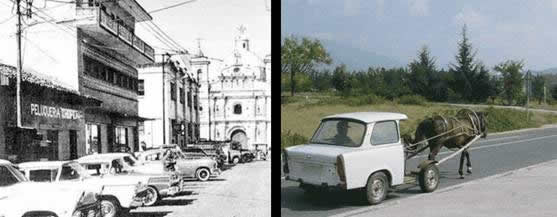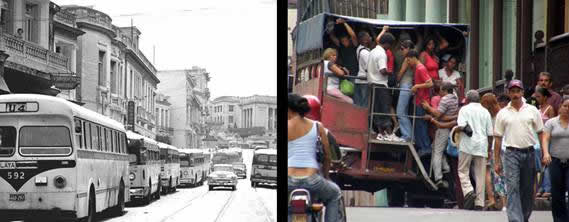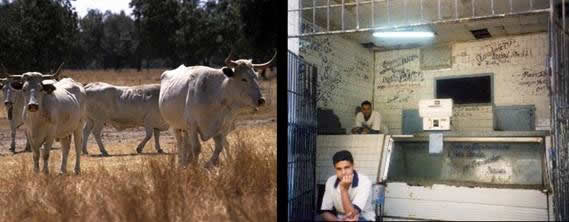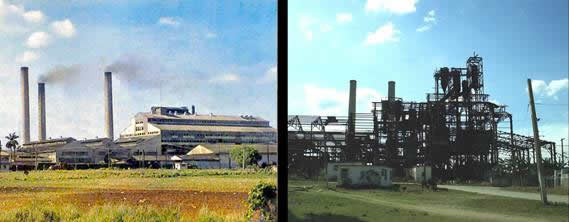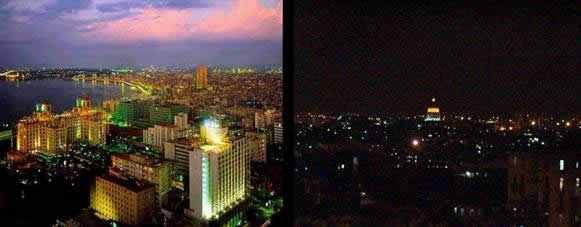Fifty Years of a Failed RevolutionJanuary 5, 2009
We think of Cuba as a third-world country, and indeed it is today. But not many people know that when Castro overthrew its government fifty years ago, Cuba was a prosperous nation with a thriving economy. In fact, it had the highest standard of living of any nation in the Caribbean. Today its economy and infrastructure are in ruins. As many of you know, my beautiful wife, Ana, was born in Havana. Her family fought for years to escape Communism, finally coming to Estados Unidos (the United States) when she was eleven. For her family, like thousands of other Cuban families yearning to find freedom in the US, the phrase, "So near, yet so far," had special meaning. (We told the inspiring story of Ana's family in Conservative Truth under the title, "One Family's Journey from Communism to Freedom.") Ana eventually became a naturalized American citizen. As such, according to the Constitution, she could never serve as president of this country. But her love for her adopted country, her sense of responsibility for her duties as a citizen, and her zeal to see all people know the freedom she enjoys would put most of the candidates in our recent presidential election to shame. Ana did the research for this article, for which I thank her. While Ana drew on her personal experience and that of family members, Internet research, and numerous documentaries, many of the quotes from Cubans imprisoned in their own country come from the brave work of Spanish journalists Charo Echevarria and Maria Martinez. These ladies got into to Cuba as tourists, and armed with a very small video camera conducted interviews with dozens Cuban patriots. This was done secretly to avoid danger both to themselves and to the interviewees. Cuba was once known as the Pearl of the Antilles for its beauty and its hospitality. It has become a prison for all of its people, not just the tens of thousands of political prisoners. Due to Castro, Cuba has the dubious distinction of being one of the few nations on earth where its people regularly risk their lives to escape from their homeland.
Castro loves to blame the US embargo for Cuba's economic woes. He tells the Cuban people that if the US would only lift the embargo, Cuba would be prosperous once again. He never tells them that Communism failed in Cuba, just like it has failed in every other nation that embraced it. He doesn't tell them that Communist "economic principles" destroyed Cuba's economy, just as it destroyed Russia's. The fact is that Cuba trades freely with any nation it chooses, except that the US has some restrictions on trade. Cuba can (and does) buy food, medical supplies and most everything else from dozens of other countries. The problem is that Cuba has little to offer in the way of exports. According to Oscar Espinosa Chepe, a former political prisoner, 55% of the fertile fields in Cuba are not being planted; they are full of weeds. They could be used to grow food, but Cuba's government and economy are in such chaos that ordinary endeavors like panting and harvesting crops and getting them to market are next to impossible. Cuba is one of the most fertile nations in our hemisphere. It used to export huge amounts of food, principally sugar, fruits and vegetables. Today it has to import 85% of the food its people consume. Ironically, 40% of the food it imports comes from - you guessed it - the US, Castro's favorite enemy.
Even though the economy is so bad, the government continues to bleed the people. The reporters visited a pharmacy where the people shop, instead of a tourist establishment. They were told they could only buy acetaminophen (generic Tylenol) with a prescription! But when they offered Euros, they were sold the pills without a prescription. Later they went to the pharmacy in their hotel in Havana. There tourists could buy anything they could find in Spain. They found that the "peoples' pharmacy" had charged them the price of a bottle of acetaminophen for each pill they purchased. While they were in the pharmacy the police came in. They feared that their activities had been discovered. But the police only made everyone leave the store while they shopped. Once the police were done, the doors were opened again and regular shopping continued. It seemed that the people were used to this; they stood by the door waiting as if it was a normal occurrence. The Cuban people are industrious, honest and hard-working by nature. Prior to Castro's repression of religious freedoms, most Cubans belonged to churches and attended regularly. Today many are forced to steal from their jobs in order to survive in the jungle that Cuba has become. Young women have been sent to jail for a year or more for possessing powdered milk. Janitors steal toilet paper to resell. Hospital worker steal food. These ordinarily decent people made into thieves by this government. I was surprised to learn that there is a town in Cuba named Hershey, just as there is one in Pennsylvania - and for the same reason. Milton Hershey once had a chocolate factory in Cuba that produced the same candies as the one in Pennsylvania. Not long ago some Hershey representatives visited Cuba and looked up some of the former factory workers. They brought gifts of Hershey's chocolate. The old workers wept when they received a bar of chocolate, because it had been so long since they had such a luxury.
The Cuban government stays in power despite the fact that the vast majority of its citizens despise it. It survives by the use of fear. Castro disarmed the population decades ago (as our incoming president would like to do here), so a tiny minority with weapons can control the whole population. Oswaldo Paya Sardinas, the leader of the Christian Liberation Movement, was the founder of the Varela project (see LINK below). This was a petition drive based on rights granted in the little-known Article 88. It petitioned the government to provide human rights as free speech, free enterprise, free assembly, the release of political prisoners, and of course democratic elections. Can you imagine having to ask your government for rights that are so basic that we take them for granted? The project was begun in 2001. Article 88 required the signatures of at least 10,000 registered voters on the petition. In 2002 and again in 2003 the petition was presented to the Cuban Assembly at huge personal risk to both the organizers and the signers. Eventually more than 30,000 signatures were gathered. This in a country where there is no real reason to be a registered voter, since The Communist Party is the only party allowed, and Castro is the only one on the ballot. (Now that Fidel Castro is sick, his brother Raul Castro is the only one on the ballot.) Minervo Chil Siret is another member of the Christian Liberation Movement who was interviewed about the Project: "I was accosted in my home and threatened with harm, even death, if the revolution were to fail because of what we were doing. My mother came to visit me from Miami. She was detained at the airport told that I was doing bad things. They told her that she had to convince to stop. On her way back to Miami, she was detained again and asked if she had convinced me to stop making trouble. When she answered no, they told her that whatever they did to me would be on her head." Castro's response to the Varela Project was to incarcerate 80 of the organizers. They were given mock trials and sentenced to up to 28 years in the filthy dungeons Cuba calls prisons. These bear no resemblance to the prisons and jails you may have seen. Many prisoners commit self mutilation so they can go to the clinic, just for a chance to get out of their cells for a short time. So horrible are the conditions in these hellholes that a 28 year sentence could well be a death sentence. Sardinas' house was robbed of the signatures pages he had collected, but because he was so well known (he had been nominated for a Nobel Peace Prize) he was never arrested. However he is under constant surveillance, and continues to be harassed and threatened. An organization called the Ladies in White is made up of the wives of the 80 political prisoners imprisoned in 2003. These were dissenting journalists and writers. Castro and his totalitarian government fears writers as well as books. Private libraries are banned in Cuba. These women peacefully protest their husbands' incarceration and treatment, which often includes torture. The government has had them fired from their jobs. They have been arbitrarily arrested. Some have been dragged from their homes and beaten by the Committee for the Defense of the Revolution in their neighborhoods. (These are the thugs that spy on their neighbors in exchange for favors from the government.) Laura Pollan, the wife of political prisoner Hector Maseda, says, "We are peaceful. We are citizens. We are not political - we are women defending our families. The government insults us and yells obscenities at us when we are marching. They moved our husbands far away so that we cannot see them. But my husband smuggled out letters and told me they drop the prisoners from heights, causing internal bleeding and do other tortures. Before they took him away, he told me I did not need to be ashamed of him. 'I am not a murderer, nor a rapist, I am not common criminal. I am a simple man who has a responsibility, and I will carry out until its ultimate consequence.'" The Spanish reporters say that they took away the same message over and over, in varying words: An anonymous woman said, "To those that watch this, I say, don't forget that we are here. Because if the world forgets us, then my husband may die." Laura Pollan said simply, "Tell people that human rights are being violated in Cuba." Oscar Espinosa Chepe pled, "I want a reconciled Cuba, so that the hatred that has been here for so many years will end." The tragedy is that most Americans don't understand the plight of the Cuban people. Our liberal press adores Castro. They glamorize him, calling him a "Revolutionary Leader" instead of the barbaric dictator he is. And when Jimmy Carter, the bumbling ex-president, visited Cuba, he praised Castro, causing even more damage and confusion. You can be sure that as long as the Castros are in power there will be no freedom and no justice for the Cuban people. We need to encourage our government to do everything in its power to remove the Castro cancer from Cuba and free its longsuffering people.
Photos of Cuba Fifty Years Ago and Today (These are amazing. The captions are in Spanish, but it's easy to figure out what you're seeing.) The Varela Project
| ||||||||||||||||||||||||
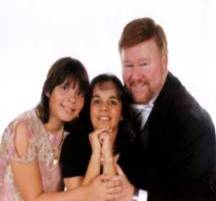 Dr. Tom Barrett is a pastor, teacher, author, conference keynote speaker, professor, certified executive coach, and marketplace minister. His teaching and coaching have blessed both church and business leaders. He has been ordained for over 40 years, and has pastored in seven churches over that time. Today he “pastors pastors” as he oversees ordained and licensed ministers in Florida for his ministerial fellowship. Dr. Tom Barrett is a pastor, teacher, author, conference keynote speaker, professor, certified executive coach, and marketplace minister. His teaching and coaching have blessed both church and business leaders. He has been ordained for over 40 years, and has pastored in seven churches over that time. Today he “pastors pastors” as he oversees ordained and licensed ministers in Florida for his ministerial fellowship.He has written thousands of articles that have been republished in national newspapers and on hundreds of websites, and is a frequent guest on radio and television shows. His weekly Conservative Truth article (which is read by 250,000) offers a unique viewpoint on social, moral and political issues from a Biblical worldview. This has resulted in invitations to speak internationally at churches, conferences, Money Shows, universities, and on TV (including the 700 Club). “Dr. Tom,” as his readers and followers affectionately refer to him, has a passion for teaching, as you can see from his ministry website (www.ChristianFinancialConcepts.com); his patriotic site (www.ConservativeTruth.org); and his business site (www.GoldenArtTreasures.com). Tom's friend Dr. Lance Wallnau wrote of him, "Tom Barrett is a Renaissance man with a passion for subject matter ranging from finance to theology and American history." Visit Dr. Tom Barrett's website at www.DrTom.TV
|

